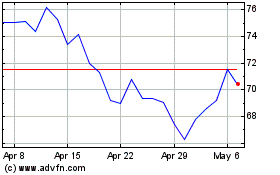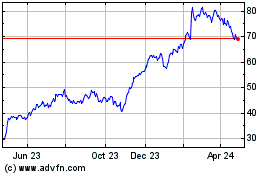Food Delivery's Big Coronavirus Test: Can It Deliver?
March 15 2020 - 1:29PM
Dow Jones News
By Heather Haddon and Preetika Rana
For food-delivery companies, the new coronavirus poses a complex
puzzle: It could boost customer demand but batter the restaurants
that supply the food and threaten the health of workers who deliver
it.
Initial signs from areas like Seattle that were hard-hit early
on by the U.S. outbreak show robust orders for food delivery, as
employees are urged to work from home and schools close. But
customers also are cutting back on actual visits that are important
to restaurants' profitability.
Grubhub Inc. said Friday it would defer the collection of
marketing commissions charged to independent restaurants it
delivers for, amounting to roughly 10% to 15% an order. The
Chicago-based company said it would defer those costs for now up to
$100 million, and the policy would last for an indefinite period
beginning Monday.
That followed Postmates Inc. saying this past Tuesday it would
temporarily waive all commissions for San Francisco-based
businesses that want to join its platform to take advantage of
consumers avoiding in-restaurant dining.
Restaurants who have struck deals with the delivery companies
are highlighting that alternative for customers. Chipotle Mexican
Grill Inc. said Thursday it was waiving delivery fees for the month
and shipping to-go orders in tamper-proof bags. The same day,
Starbucks Corp. sent a notice to U.S. customers about potential
disruptions to its stores and highlighting delivery through Uber
Technologies Inc.'s Eats division as a workaround.
The U.S. outbreak comes as food-delivery companies are in an
intense battle for customers and restaurant partnerships. Companies
shuttling food to customers' homes could benefit from coronavirus
if they shore up diner loyalty and restaurants remain open and
willing to deliver during the outbreak, according to Wall Street
analysts.
Food-delivery orders increased in China in January when the
pandemic first hit, according to industry research-firm NPD Group
Inc. But delivery companies experienced a drop of business a month
into the pandemic there as restaurants shut, consumers worried
about food contamination and the quarantining of drivers challenged
operations, according to a Credit Suisse report. Orders were down
30% in February from typical averages, then started to recover as
cities resumed business, restaurants reopened and service options
such as contactless delivery took hold, the Wall Street firm
found.
The U.S. companies are taking steps to reassure customers that
their services are safe. Several are permitting front-door
drop-offs to limit contact between drivers and consumers.
In Seattle, restaurant sales declined 10% in the week through
March 1 compared with a previous four-week average, according to
industry firm Black Box Intelligence. To-go sales at restaurants
grew by more than 10% during the same time period.
"I go out less than I normally would," said Oscar Avatare, a
23-year-old student at the University of Washington in Seattle.
"For certain meals that I would get with friends before, I now just
get on Uber Eats," he said. His university has suspended classes
for two weeks.
Nationwide spending on food delivery in the U.S. shows modest
week-over-week growth through Feb. 24, according to market-research
firm Edison Trends. Spending also grew year-over-year, though at a
slower pace compared with last year because DoorDash Inc., Eats and
Postmates rapidly grew on the back of aggressive sales and
marketing in the first half of 2019, according to Earnest Research.
Most restaurant chains didn't approach that level of growth, and
some experienced falling sales, the firm found. Meanwhile, other
discretionary spending fell sharply over the same period.
DoorDash, Grubhub, Uber Eats and Postmates declined to
comment.
It remains to be seen if customers shun food delivery out of
fear of any exposure to germs from the courier or meal.
"You can't control the supply chain with food delivery," said
Jonathan Padilla, a 31-year-old Stanford University researcher
focused on blockchain, who is avoiding getting food sent to him for
now.
Food-delivery companies are fighting to build customer loyalty
as the sector matures. Companies that pushed for growth at all
costs are now working to strengthen their finances. DoorDash
confidentially filed for an initial public offering last month.
Postmates is also considering a listing.
Food-delivery companies separately risk alienating their
gig-economy drivers at a time that they need them the most.
Companies are instructing drivers to avoid working if they feel
sick, but face a conundrum: Without them, they can't deliver
orders. Many drivers are demanding paid time off, so they can stay
at home if they feel sick without having to worry about paying the
bills.
"We are exposed to this virus way more than anyone, yet we are
denied any benefits," said Mostafa Maklad, a 36-year-old who
delivers for services in San Francisco. "Should I stay at home and
let the bills accumulate, or should I just risk it and work to
survive?"
Uber and DoorDash have said they would compensate drivers
infected or quarantined by a public-health agency with up to 14
days of missed pay. Uber, DoorDash, Grubhub and Postmates are
separately weighing banding together to set up a compensation fund
for drivers. DoorDash said it is handing out gloves and hand
sanitizers to its drivers. Postmates said it would also support
medical checkups for its drivers.
Write to Heather Haddon at heather.haddon@wsj.com and Preetika
Rana at preetika.rana@wsj.com
(END) Dow Jones Newswires
March 15, 2020 13:14 ET (17:14 GMT)
Copyright (c) 2020 Dow Jones & Company, Inc.
Uber Technologies (NYSE:UBER)
Historical Stock Chart
From Mar 2024 to Apr 2024

Uber Technologies (NYSE:UBER)
Historical Stock Chart
From Apr 2023 to Apr 2024
